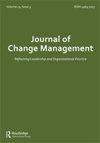领导者理念倡导追随者是否准备好改变?亲社会情感给予的适度中介视角
IF 3
Q2 MANAGEMENT
引用次数: 1
摘要
变革动因影响员工的态度,以促进组织的变革。为了揭示这种影响机制,我们研究了变革领导者-接受者的关系。更具体地说,变革领导者的支持(自变量)与接受者的变革准备(因变量)之间的关系。我们的变革领导者亲社会感觉给予的概念模型是基于成人依恋理论,通过讲故事来运作的。为了测试我们的模型,我们调查了不同行业中164个正在经历组织变革的变革接受者。结果证实了模型的第一部分:心理需求满足部分中介了变革领导者拥护与接受者变革准备之间的关系。换句话说,亲社会变革领导者作为依恋人物,缓解了由模糊性引起的焦虑,解决了变革接受者的接近寻求行为。尽管在学术著作中有这样的描述,但变革领导者的说服方法似乎更准确地反映了接受者对变革的准备程度。我们假设模型的第二部分不能被证实:领导影响力和叙事智力的调节效应不能被证实。我们的结论是,具有叙事智力的亲社会变革领导者利用故事引起变革接受者的情绪反应,有效地提高了他们感知到的心理需求满意度,最终影响了他们的变革准备。我们的研究旨在解构亲社会组织变革领导的潜在机制。我们研究了变革领导者如何利用倡导、叙事智力和领导力影响策略来影响变革接受者的变革相关态度,并影响他们对变革的个人准备。我们证实,变革接受者的心理需求满足部分中介了这种关系,而领导影响策略的直接应用是一个更好的预测因子,与文献所表明的相反。我们建议从业者创造引人注目的叙述,以努力提高信息的接收,并利用特定的领导影响策略来确保信息被接收。本文章由计算机程序翻译,如有差异,请以英文原文为准。
Leader Idea Championing for Follower Readiness to Change or Not? A Moderated Mediation Perspective of Prosocial Sensegiving
ABSTRACT
Change agents influence employee attitudes in order for organizations to change. In an effort to unravel this influence mechanism, we examined the change leader-recipient relationship. More specifically, how change leaders’ championing (independent variable) relates to recipients’ readiness to change (dependent variable). Our conceptual model of change leaders’ prosocial sensegiving is based on adult attachment theory operationalized through storytelling. To test our model, we surveyed 164 change recipients undergoing organizational change in various industries. Results confirm the first part of our model: psychological need satisfaction partially mediates the relation between change leaders’ championing and recipients’ readiness to change. In other words, prosocial change leaders act as attachment figures alleviating anxiety caused by ambiguity addressing change recipients’ proximity-seeking behaviour. Despite what has been described in scholarly works, change leaders’ methods of persuasion seem to be a more accurate indicator of recipients’ readiness for change. Part two of our hypothesized model could not be confirmed: moderation effects of leader influence and narrative intelligence could not be confirmed. We conclude that prosocial change leaders’ who demonstrate narrative intelligence use stories to elicit an emotional response from change recipients, effectively increasing their perceived psychological need satisfaction, ultimately affecting their readiness to change. MAD statement Our research aims to deconstruct the underlying mechanics of prosocial organizational change leadership. We study how change leaders utilize championing, narrative intelligence and leadership influence tactics in an effort to influence change recipients’ change-related attitudes and affect their individual readiness to change. We confirm that change recipients’ psychological need satisfaction partially mediates this relationship and that the direct application of leadership influence tactics is a better predictor, contrary to what literature suggests. We recommend practitioners create compelling narratives in an effort to enhance message reception, and utilize specific leadership influence tactics to ensure the message is received.
求助全文
通过发布文献求助,成功后即可免费获取论文全文。
去求助
来源期刊

JOURNAL OF CHANGE MANAGEMENT
MANAGEMENT-
CiteScore
6.60
自引率
20.00%
发文量
14
期刊介绍:
Journal of Change Management is a multidisciplinary and international forum for critical, mainstream and alternative contributions - focusing as much on psychology, ethics, culture and behaviour as on structure and process. JCM is a platform for open and challenging dialogue and a thorough critique of established as well as alternative practices. JCM is aiming to provide all authors with a first decision within six weeks of submission.
 求助内容:
求助内容: 应助结果提醒方式:
应助结果提醒方式:


